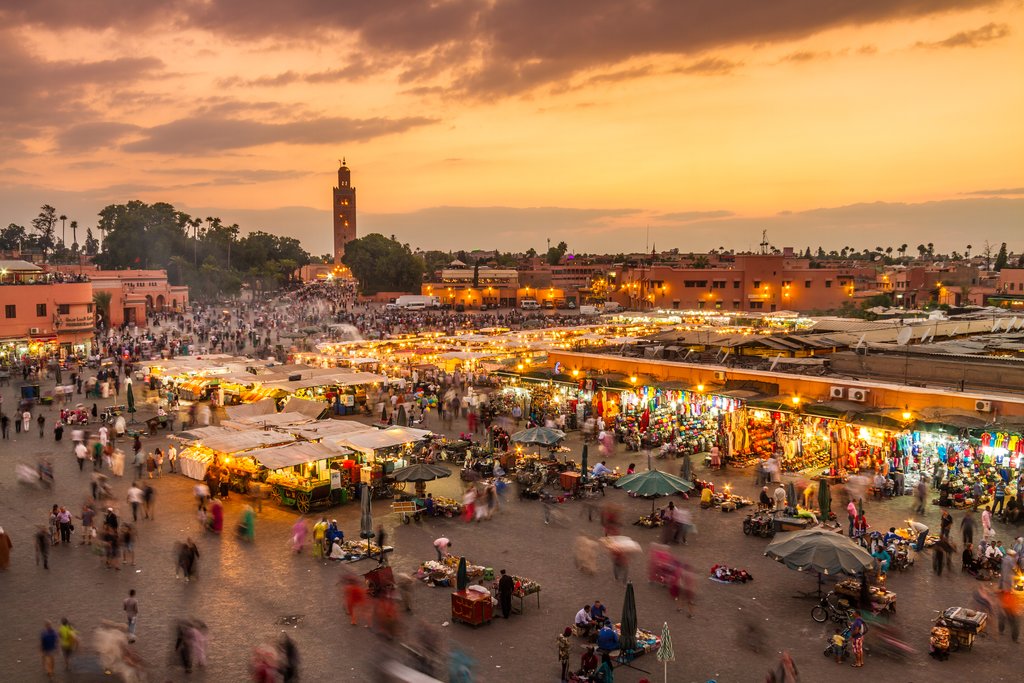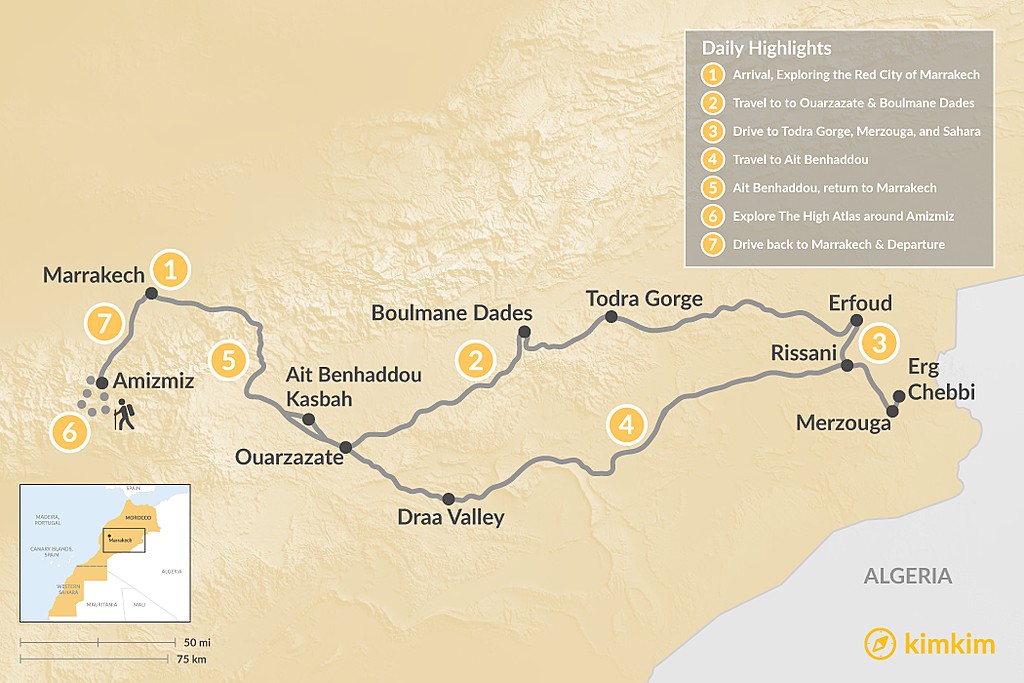Highlights
- Watch musicians, acrobats, and snake charmers in Jemaa el-Fna Square
- Admire the High Atlas Mountains as you hike through the foothills
- Explore old fortified kasbahs and desert oases featured in your favorite films
- Enjoy Berber music by a campfire under a starry Sahara Desert sky
- Break bread with a Berber family and experience local traditions and hospitality
Brief Itinerary
| Day | Highlights | Overnight |
|---|---|---|
| Day 1 | Arrive in Marrakech, Explore | Marrakech |
| Day 2 | Over the High Atlas mountains into Morocco's desert | Boumalne Dades |
| Day 3 | Land of A Thousand Kasbahs, fossil workshops, and sunset in the Sahara | Erg Chebbi |
| Day 4 | Hidden oases and Aït Benhaddou Kasbah | Aït Benhaddou |
| Day 5 | Tizi n'Tichka Pass over the High Atlas mountains to Marrakech | Marrakech |
| Day 6 | Hike through small villages in the Atlas Foothills | Amizmiz |
| Day 7 | Return to Marrakech, Depart |
Detailed Itinerary
Day 1: Arrive in Marrakech, Explore

Welcome to Morocco! Welcome to Marrakech! Nicknamed the "Red City" (for its 1000-year-old red sandstone city walls and buildings), Marrakech is a major economic center and home to a thriving medina (old Arab quarter). Begin your day exploring the 12th-century Koutoubia Mosque and take respite from the heat in its gardens amid fountains, pools, and palms. Indulge your senses and explore the spice market, Souk el-Attarin, or Souk Smata for your choice of slippers, rugs, and leather goods. Visit Souk des Teinturiers to see firsthand how leather hides and cloth are dyed. Next, visit the Islamic school, Ben Youssef Madrasa, for a taste of 16th-century architecture and marvel at the exquisite details: arabesques, Islamic calligraphy, and colorful geometric tile work.
As you walk Marrakech's alleys, notice the Fondouks or Caravanserai—medieval traveler inns along ancient trade routes that provided travelers and traders with shelter and supplies. Meet your guide for a half-day tour of Jemaa el-Fna in the medina and discover the square's rich history, culture, and hidden gems. A UNESCO World Heritage Site, Jemma el-Fna comes alive in the late afternoon with vendors and musicians, acrobats and storytellers, and even snake charmers.
Depending on the timing and your energy level, you may wish to visit a few sites south of Jemaa el-Fna. Some options to consider are the 500-year-old Saadian Tombs, the extensive courtyard and sunken gardens of the 17th-century El Badi Palace, or the intricate woodwork and painted ceilings of the 19th-century Bahia Palace. Return to Jemma el-Fna for a bite to eat before retiring to your accommodation for the evening.
Day 2: Over the High Atlas mountains into Morocco's desert

Leave Marrakech behind and venture into the desert, traveling up and over the High Atlas mountain range toward Ouarzazate. On a clear day, spot Mount Toubkal, the highest peak at 13,671 feet (4,167 m). Pass Berber farmlands and villages and admire the mountain people's traditional mud-brick homes. Along the way, stop for refreshment in Taddert and visit the local Argan Oil Co-operative to learn about and sample the oil. Continue on to the Tizi n'Tichka mountain pass (7,415 feet or 2,260 m) that links Marrakech to Ouarzazate. Stretch your legs and admire the panoramic vistas of the winding road and the craggy mountains.
Descend Tizi n'Tichka and arrive in Ouarzazate, a gateway to the Sahara Desert, and home to one of the world's largest movie studios. Join an optional studio tour for an up-close look at props and sets and learn how the nearby regions have been featured in many films, portraying desert landscapes in fiction (Game of Thrones) and non-fiction (Lawrence of Arabia or Gladiator). Continue east toward Boumalne Dades, passing the El Mansour reservoir, along the road of one thousand kasbahs. Have your camera ready to snap photos of the mud-brick forts once built to fend off invaders. Pass through Kelâat M'Gouna, the Valley of the Roses, until you reach your destination, Boumalne Dades.
Day 3: Land of A Thousand Kasbahs, fossil workshops & sunset in the Sahara

Start your day driving through the desert until you reach idyllic Tinerhir, located in the center of an extensive oasis (30 miles or 48 km of lush palm trees following Wadi Todra). Admire the Todra Gorge—984 feet (300 m) high—and the Todra River that cuts through the red limestone to make it. Take a leisurely walk to explore the gorge and relax in the cool water of the shallow river below. Continue driving through the arid landscape, making the optional stop in several small towns along the way, including Erfoud, known for its figs and fossils. Visit a craft workshop to learn how the fossil-rich rocks are carefully and skilfully transformed into both practical and decorative objects.
As you near Merzouga, catch your first sightings of the massive sand sea of Erg Chebbi, looming on the horizon. Here the sand dunes rise to over 656 feet (200 m), covering 14 square miles (35 square km) of land. Hop on a camel and ride into the desert to enjoy the setting sun atop a large dune. Return to your Erg Chebbi camp for dinner. Relax around the campfire listening to traditional Berber music and admiring the vast star-lit night sky before retiring to your Bedouin-style tent.
Chat with a local specialist who can help organize your trip.
Day 4: Hidden oases and Aït Benhaddou Kasbah

Rise early to witness a Saharan sunrise, before exploring more of the Desert. There is the option to rent a sandboard and test your skills on the dunes, join a quad ATV tour, or relax by a pool. Afterward, head to nearby Khemliya (or Khamlia) to wander this traditional Saharan village and enjoy drumming music and dancing. Make your way west, stopping in Rissani to visit the livestock auction and the "donkey parking lot" or to check out Maison Touareg, a storehouse of authentic handicrafts, including carpets, jewelry, pewter, and leather goods. Continue west toward Ouarzazate, driving past umbrella-shaped acacia trees before lunching in Alnif. From there, travel through the verdant Draa Valley stopping to pick up a box of fresh dates from the local date palmery.
In the early afternoon, reach the UNESCO-protected kasbah of Aït Benhaddou. Wander the maze-like lanes and passageways passing by 11th-century buildings before climbing up to the old Granary—a perfect spot to admire Aït Benhaddou and the surrounding area. Keep an eye out for the ancient camel caravan trade routes that once connected the Sahara and Marrakech. As you continue to explore Aït Benhaddou, movie and Game of Thrones enthusiasts will enjoy visiting sites featured in the epic HBO series as well as movies like Gladiator, Lawrence of Arabia, and The Jewel of the Nile. Stay the night in an old Kasbah converted into an auberge and enjoy wandering the small streets after the day-crowds have long since left. Eat dinner on a terrace overlooking the river and valley below.
Day 5: Tizi n'Tichka Pass over the High Atlas mountains to Marrakech

Say goodbye to Aït Benhaddou, though not before rising early to explore more of the Kasbah before the crowds start filtering in. Return to Marrakech through the Tizi n'Tichka Pass for your second opportunity to appreciate the stunning views from the top of the Pass. Descend the north-facing slopes of the High Atlas and notice the dramatic change in climate and landscape as you leave the arid climate behind. After the quiet of the mountains and the desert, soon you will be in the midst of the hustle and bustle of vibrant Marrakech.
Depending on your energy level and timing, explore Marrakech as you like. Some additional options to consider are the Almoravid Koubba, the only intact Almoravid monument, the Marrakech Museum, housed in the Dar Mnebbi Palace (19th century) with a collection of sculptures and Moroccan artwork, or the Museum of Moroccan Arts and Crafts, known for its extensive woodwork collection. Or if you prefer, stay close to your accommodation and relax in one of the many cafés that surround Jemaa el-Fna for a warm tagine meal and an overview of the lively square.
Day 6: Hike through small villages in the Atlas Foothills

Today you will venture south of Marrakech to the small town of Amizmiz in the foothills of the High Atlas Mountains (about one hour away). Spend time exploring the modest market in the old town before joining your mountain guide to trek the narrow roads and mule paths in the surrounding hills. Hike between small Berber villages and observe the local farmers and shepherds as they tend to their animals and the landscape. You may even see children on their way to or from school, which are typically shared between a few nearby villages.
Stop and enjoy lunch with a local family and gain insight into their daily lives as you learn how to make homemade bread. Continue your hike into the afternoon before returning to another local Berber home where you will be welcomed for dinner and provided with a room to retire for the evening.
Day 7: Return to Marrakech, Depart

Enjoy breakfast with your hosts before saying farewell and set out on the trail once more. Today you have the option of continuing hiking to further explore hillside towns and regional scenery before meeting your transfer to return to Marrakech.
Upon arriving in Marrakech, complete any last-minute gift and souvenir shopping. Or depending on your departure details, you may wish to check out Majorelle Gardens. Not far from the commotion of the medina, a visit to these lush and expansive gardens offers the perfect place to escape the afternoon heat and noise. Leave the quiet behind and bring with you your memories as you make your way home.
More Great 7-Day Morocco Itineraries
Looking for more inspiration for your trip to Morocco? Check out these other 7-day Morocco itineraries, with outdoor adventures, cultural trips, and best-of tours to hit the highlights.








